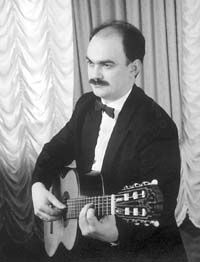The guitar is almost as whimsical as a woman. Now it cries, pouring out its soul in a tremulous voice, vibrates to a strong captivating dancing rhythm, then it melts in a heartfelt romance. The guitar can be vigorous, sensuous, tender, impassioned...
That was precisely how Italian musician Paolo Pegoraro played. Plucking the strings, he portrayed fresh morning landscapes, weaving bewitching melodious patterns (Castelnuovo-Tedesco’s Guitar Concerto No. 1) and captivated the audience with temperamental Spanish dances or tragically emotional lyricism (Joaquin Rodrigo’s Concierto de Aranjuez for guitar and orchestra).
Classical guitar devotees listened to Paolo Pegoraro during an Italian-Ukrainian guitar festival, held at the National Philharmonic Society as part of the Day of Italian Culture in Ukraine. Paolo Pegoraro, 33, is considered one of the best guitarists of the younger generation. Considering his age, he has had a spectacular career, winning several national and international contests as well as being very active in terms of foreign concert tours as a soloist and with symphony and chamber orchestras, conducting master classes at music schools and prestigious music festivals, teaching at the Francisco Tarrega Guitar Academy (Pordedone, northern on Italy). Pegoraro visited Kyiv with three pupils: Riccardo Tamai, Mauro Zanatta, and Egidio Fedele.
His and his pupils’ renditions showed that the modern Italian guitar school is marked by an extreme finesse of sound range and soft lyrical technique even in dramatically saturated episodes. The new generation of musicians experiences no technical problems; they are all virtuosi and can handle the most sophisticated compositions. They do have problems in terms of sound quality, so they offer an exquisite chamber approach, with subtle nuances conveyed by audio equipment and light- and-shadow effects.
The Ukrainian musicians practice a somewhat different approach; here a rich audio palette is combined with a purely Slavic openness and sincere expression. Graphic evidence was the rendition of Andriy Ostapenko, international contest laureate and soloist with the National Philharmonic Society of Ukraine.
His concert program was geared to demonstrate the guitar’s image-bearing and technical capacities. He started with Dumond’s In Memory of Ravel and its fine scale of quiet sounds and free-breathing melancholic melody helped the musician establish a cozy atmosphere of mutual confidence, reaching across to the audience. Rodrigo’s virtuoso Sonata Giocosa, markedly Spanish-colored and with a saraband rhythm, was followed by the composer’s Invitation for a Dance, with mystic-sounding flageolets, dramatically strained repeating motif, which, combined with strange chords, made the audience almost see the ritual dance.
The concert culminated in Brauer’s Elegiac Concerto No. 3, performed by Ostapenko with the National Philharmonic conducted by Mykola Diadiura. Despite the title, the composition is quite dramatic. The elegiac tone set by the solo guitar at the beginning is interrupted by the strained, even militant sound of the orchestra, followed by a confrontation, rather than competition, between the soloist and the orchestra. The lyrical movements are especially attractive when combining the guitar and xylophone, lending the melody a special coloration.
Concerto No. 3 by Leo Brauer, one of the most outstanding modern composers, performed in Ukraine for the first time, and Joaquin Rodrigo’s works (the composer’s centennial is marked across Europe, particularly by Spain, Italy, and Bulgaria, holding international memorial contests) were included in Andriy Ostapenko’s repertoire after a period of on-the-job at the Tarrega International Guitar Academy in Italy under the able guidance of Paolo Pegoraro and Stefano Viola. According to M. Mykhailenko, associate professor of the Peter Tchaikovsky National Music Academy of Ukraine (he taught Ostapenko at the Gliere Music College), “in Italy, Andriy learned a sensitive attitude toward the sound and timbre, but did not lose face in terms of dynamic and expressive rendition.”
Andriy Ostapenko has a very tight schedule these days, preparing for the Mauro Giuliani International Guitar Contest, scheduled for September in Italy. Who knows, perhaps he will visit Italy some day with his pupils, just like Paolo Pegoraro did Kyiv this summer.







